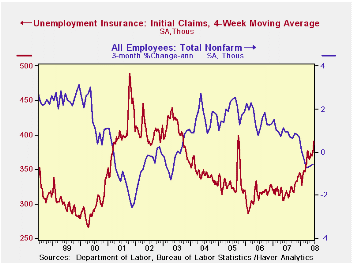 Global| Jul 03 2008
Global| Jul 03 2008U.S. Initial Claims for Unemployment Insurance Surged
by:Tom Moeller
|in:Economy in Brief
Summary
Initial claims for unemployment insurance last week surged to 404,000 versus an upwardly revised 388,000 during the prior week. Consensus expectations had been for 385,000 claims. A claims level below 400,000 typically has been [...]

Initial claims for unemployment insurance last week surged to 404,000 versus an upwardly revised 388,000 during the prior week. Consensus expectations had been for 385,000 claims.
A claims level below 400,000 typically has been associated with growth in nonfarm payrolls. During the last ten years there has been a (negative) 76% correlation between the level of initial claims and the m/m change in nonfarm payroll employment.
The four-week moving average of initial claims again rose to 390,500 (22.5% y/y). Claims averaged 369,000 during May. The numbers compare to March when initial claims averaged 375,000.
Continuing claims for unemployment insurance reversed some of the prior week's jump with a 19,000 worker decline. The four-week average of continuing claims rose to a new cycle high of 3,110,750.
Continuing claims provide some indication of workers' ability to find employment and they lag the initial claims figures by one week.
The insured rate of unemployment slipped to 2.3%.
| Unemployment Insurance (000s) | 06/28/08 | 06/21/08 | Y/Y | 2007 | 2006 | 2005 |
|---|---|---|---|---|---|---|
| Initial Claims | 404 | 388 | 25.5% | 322 | 313 | 331 |
| Continuing Claims | -- | 3,116 | 21.9% | 2,552 | 2,459 | 2,662 |
Tom Moeller
AuthorMore in Author Profile »Prior to joining Haver Analytics in 2000, Mr. Moeller worked as the Economist at Chancellor Capital Management from 1985 to 1999. There, he developed comprehensive economic forecasts and interpreted economic data for equity and fixed income portfolio managers. Also at Chancellor, Mr. Moeller worked as an equity analyst and was responsible for researching and rating companies in the economically sensitive automobile and housing industries for investment in Chancellor’s equity portfolio. Prior to joining Chancellor, Mr. Moeller was an Economist at Citibank from 1979 to 1984. He also analyzed pricing behavior in the metals industry for the Council on Wage and Price Stability in Washington, D.C. In 1999, Mr. Moeller received the award for most accurate forecast from the Forecasters' Club of New York. From 1990 to 1992 he was President of the New York Association for Business Economists. Mr. Moeller earned an M.B.A. in Finance from Fordham University, where he graduated in 1987. He holds a Bachelor of Arts in Economics from George Washington University.
More Economy in Brief
 Global| Feb 05 2026
Global| Feb 05 2026Charts of the Week: Balanced Policy, Resilient Data and AI Narratives
by:Andrew Cates






